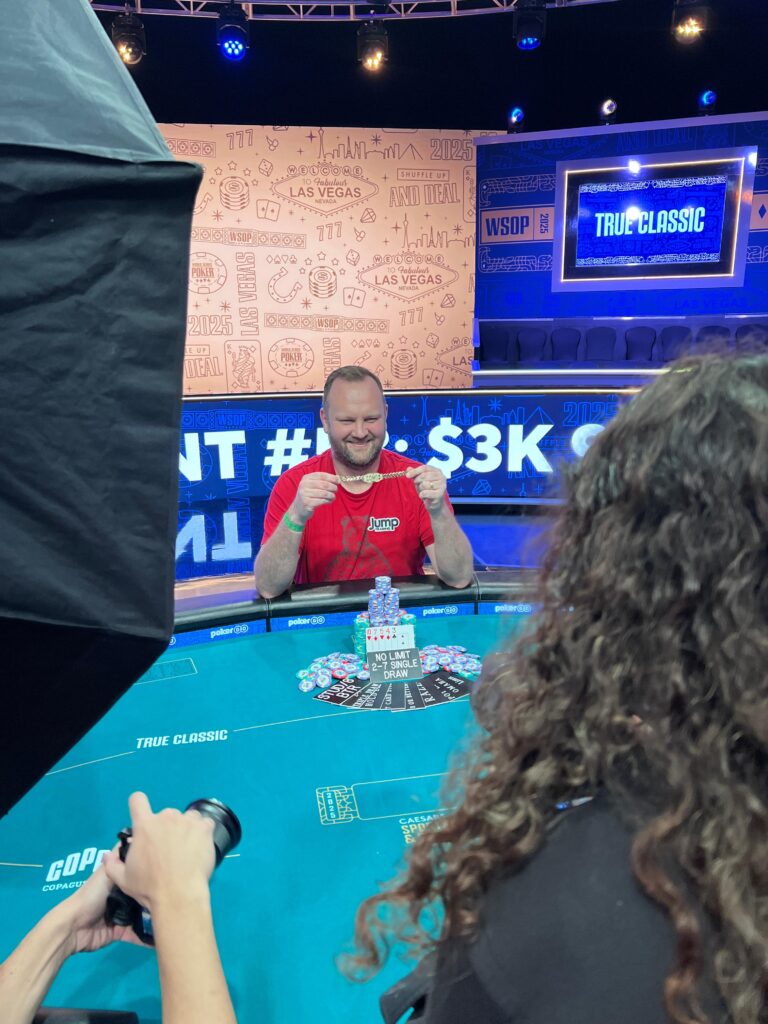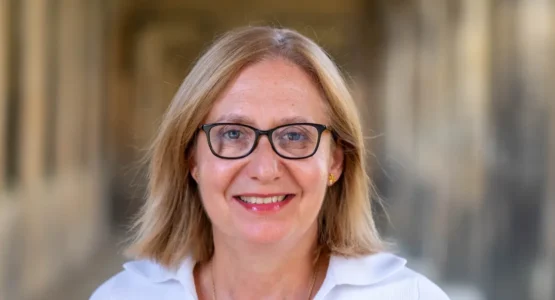How my maths PhD helped me devise a winning poker strategy
Poker player Dr Robert Wells (2000) is celebrating winning a prestigious World Series of Poker (WSOP) gold bracelet and more than $200,000 at a tournament in Las Vegas thanks to his maths skills.
Rob, who gained a PhD in maths from St John’s, has developed strategies for his poker matches based on Game Theory and mathematics that he believes have set him up for success.
He says: “Any individual tournament is a combination of luck and skill but is mostly luck. However, if you play hundreds of these tournaments, skill wins in the end.”

The quantitative trader has won more than $800,000 since taking up the game seriously two and a half years ago but explains that this is not all profit because of the buyin he must lay down for each game.
However, he is considerably up on his buyins and after careful calculations he has worked out that his wins are down to strategy and not luck. “I think we’ve got enough data now to be reasonably confident that our strategy makes a meaningful difference to our win/ loss ratio”, he says.
“This is my third full World Series, and it is unusual to win a bracelet so soon, but it’s the trophy that anyone interested in poker really wants to win.”
His friend and study partner Yuri Dzivielevski, a professional poker player, played for five or six WSOPs before winning a bracelet, says Rob. “And he’s probably one of the best online poker players in the world.”
Rob’s latest big win, on day 28 of the 2025 World Series of Poker, saw him defeat more than 400 players in the Nine Game Mix. The tournament went on into the early hours of the morning and he eventually took home $228,115 and a WSOP 14k gold bracelet.
Mixed Game tournaments are much more complex than traditional No-Limit Texas Hold’em poker. Mixed tournaments at the WSOP have between five and twenty-one different variants, while the tournament Rob won has nine variants.
He says: “In Mixed Game tournaments, the type of game changes every six to seven hands. You must develop strategies and approaches for all the games in a particular mix.”
There are existing computer programmes that help players with their strategy for the “Hold’em” games.
“In No-Limit Hold’em, the maths and software side has already been worked out by someone else,” says Rob.
“So now you’ve got people with 20 years’ experience on me who have access to all this information, and they don’t have to engage with how to figure this stuff out. I think I have an advantage in the Mixed Games because it all has to be worked out from scratch. I’d guess there are very few people looking at the Mixed Games like this.”
In spite of popular beliefs that poker success is down to understanding the psychology of other players, in fact: “There’s another approach that is all about the numbers,” Rob explains.
“Most people hear poker and maths being linked and they think it’s about probability, and that’s sort of true, but that’s true at level zero. That’s stuff you need to know to even get to the start line. It’s much more about Game Theory and figuring out the right strategy. People often assume, for example, that mathematics can’t figure out bluffs but that is one of the first things that drop out when you start analysing the game. To me it is like an interesting maths research problem. That’s what originally sparked my interest in the game.”
Rob credits a book called The Mathematics of Poker by Bill Chen with introducing him to the idea of using his PhD to take on this challenge. “I’ve always played poker. I even played while I was at St John’s,” he says.

The process of looking into the application of maths to poker led him to meeting a group of Brazilian players that included Yuri. “I told him I’d been looking at these games, made some observations, and had ideas for strategies. He tried them out and it worked pretty well for him.”
Since then, they have analysed games they both play to work out their strategies and around two years ago he went part time in his job to concentrate more on poker. This, he insists, was a calculated move. “It may sound strange, but I hate gambling,” Rob says.
“I have no interest in horse racing, for instance. But using strategies to work out the best way to play and even the right level of stakes for me to play, feels more like chess.
“It’s not gambling in that I’m not paying money to take a risk to generate a thrill; I’m doing my very best to find places where I think I have an edge and then manage that risk as best I can.”
“It’s possible that if I stop winning, I will still study it and then just play for very low stakes, just for the intellectual challenge.”
Since 2011 when Robert finished his PhD, he has worked in quantitative trading, which uses mathematical models and automated trading strategies to seek opportunities for profit in the financial markets.
He explains: “There’s a lot of overlap between poker and financial markets; for example, you’re looking at things like: this is my trading portfolio, these are all the stocks I hold and this is the right amount of risk to hold for the amount of capital the company has. Poker is the same. Which tournaments should we play given our current amount of capital? It’s working out the right level of risk to be taken for the amount of money that we have.”
For now, Rob plans to carry on playing and working on his strategies, and his next big goal is: “to win more bracelets!”





